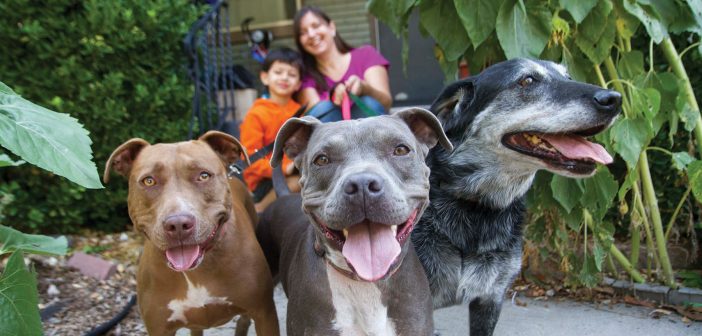by Temma Martin
Few can argue that welcoming a new dog into your home is a very exciting time, and many people choose to do it around the holidays. Since dogs generally live for ten to twenty years, making that choice carefully – and making a lifetime commitment to your pet – are very important.
With dogs of every variety available for adoption, there are many things to consider, and it’s a good idea to do some homework before you set out to visit your local shelter or rescue group. A dog’s breed, age, size, activity level and hair length will all be important factors in selecting a canine companion who will fit well into your family and lifestyle.
Another especially important thing to consider is a dog whose personality, exercise needs, size and behavior match your stage in life, and those of your family members.
For example, many people with young children say they want to get a puppy, so the puppy and the children can grow up together. Although this sounds good on paper, the truth is, puppies are a lot of work and can to be overwhelming. Puppies, until they’re old enough to be trained and learn the rules, are goofy and wild, and are likely to bite, scratch, chase and knock over the children in the family for months. Puppies who behave this way are just being puppies, but it can be very scary and painful for children. Puppies are often given up to shelters when the family reaches its limit on managing puppy behavior with young children, which is heartbreaking for everyone.
Many families have discovered that choosing a dog breed known for being friendly and patient with children, and having shelter or rescue staff and volunteers help them select an individual adult dog who has a positive history of living with children, results in less stress and a better relationship within the family.
People without kids in the home especially appreciate their pets for the unconditional love and companionship they provide. It’s common for college students to want to celebrate their first taste of living independently by getting a dog, but this is an especially important time to look at the big picture and imagine life over the next ten to twenty years. Given how often students move during those years, they will likely find themselves in and out of apartments that allow (and don’t allow) pets. Many college students choose to volunteer at shelters or rescue groups to get their “pet fix,” but make the educated decision to wait until they are more settled before they adopt their own.
For many people, their lifestyle is the greatest consideration in choosing the dog. How busy are you? How much are you home? How active are you? How do you feel about a dog that sheds a lot or requires professional grooming? Both breed and individual personality are factors, and that’s why shelter staff and volunteers are especially helpful matchmakers. They know the dogs and often their histories and personalities, so they can help place active dogs with active people and mellower dogs in less active homes. Dogs who were bred to have a job to do, like Heelers, Border Collies and Australian Shepherds, can become bored if they’re not entertained and stimulated, and their frustration can lead to behavior problems. People who run, walk and hike, do great with active dog breeds.
Seniors need to choose their canine companion carefully. Numerous studies have shown pets have all kinds of positive benefits in the lives of seniors, but a wild, young dog is probably not the best place to start. Likewise, a large mellow obedience-trained dog can be a wonderful furry friend, but a large dog who pulls hard on the leash or jumps up can possibly cause injuries to her owner. Many seniors prefer small dogs to be their companions, but small in size does not always equate to low energy level. A very busy, active dog like a Jack Russell Terrier can prove to be too much for a senior owner. Many shelters have special “Seniors for Seniors” programs where people over age 55 can adopt dogs or cats over age five for free.
When it’s time to adopt a new four-footed family member, doing a little online homework first, checking www.perfinder.com, and then visiting a shelter or rescue group is a good way to go. Those in animal welfare are dedicated to finding fantastic forever homes for the animal in their care, so they’re experienced at helping people find their perfect match.
Temma Martin is a public relations specialist for Best Friends Animal Society, a national animal welfare organization dedicated exclusively to ending the killing of dogs and cats in America’s shelters. Best Friends runs the nation’s largest no-kill sanctuary for companion animals, as well as programs in partnership with rescue groups and shelters.





